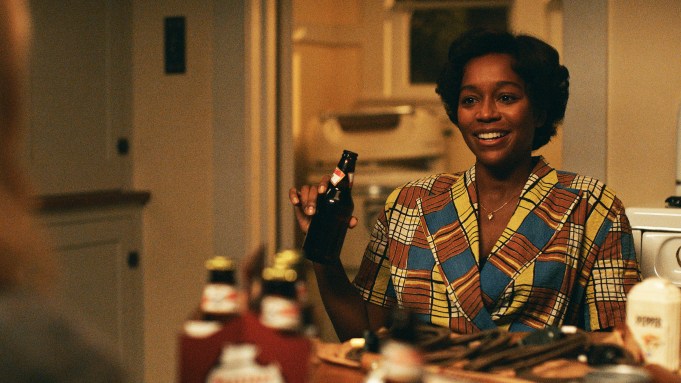

In Lessons in Chemistry, Aja Naomi King is Harriet Sloane, a 1950s lawyer and mother who lives across the street from the protagonist Elizabeth Zott (Brie Larson). In Bonnie Garmus’ original novel of the same name, Harriet was an older white woman who helped Elizabeth to raise her baby. But for the Apple TV+ series, creator Lee Eisenberg gave King a more powerful role, one that sees Harriet organizing a protest against a freeway that would force Black residents from their homes. Here, King describes how she connected to Harriet and a storyline that could be ripped from today’s headlines.
DEADLINE: Didn’t you initially audition for a different role in Lessons in Chemistry?
AJA NAOMI KING: Yes, I was going to play this other part. I can’t even remember the character’s name now. It was a totally invented part, not in the book at all. And I remember having a conversation with Lee after the fact and him just being like, “There’s something missing in this story. Harriet’s a pivotal character in the story, and for the people that love the book, we can’t take that away from them.” He told me he originally wanted to merge these characters. But it was like that other character that I was brought into play, she was gone forever, and now I’m Harriet.
I also read the book, and loved the book, and I also thought Harriet was a really pivotal character, but I didn’t see how that could fit me. I was like, we’d have to have a lot of conversations around this because it genuinely feels inappropriate, the notion that I’m a Black woman with my own kids living across the street, and I’m just going to drop everything in my life and come take care of this woman’s kid. And Lee was like, “The essence of what Harriet was, that’s what we want to hold onto. But you will be in a very healthy, wonderful marriage and you will already be employed.” He was like, “Harriet will have her own things going on. She will be her own person who’s standing on her own and isn’t going to exist solely in service to Elizabeth Zott.”

DEADLINE: If anything, your version of Harriet tolerates Elizabeth rather than being in service to her.
KING: Well, what’s so wonderful is we see this true friendship being built. And I mean, the way they created it, these two women have this close relationship with [Elizabeth’s partner] Calvin [Lewis Pullman]. And at the time of his death, these two women were his only family. And so we connect on that immediately. Harriet’s immediately on this crusade to right the wrongs of what’s being written about him in the newspaper and that’s what brings her to Elizabeth’s door, or technically, what was Calvin’s door in the first place. And I do think a lot of that was also guilt-related because of Harriet and Calvin’s last interaction where she felt let down by him. And it’s just a beautiful reminder of, you never know when it’s the last time you’ll speak to someone, so don’t hold a grudge, be an adult, have the conversation. And I think Harriet does beat herself up about that and she needs the same kind of closure, I think, that Elizabeth is craving after his loss.
And then of course, there’s Elizabeth’s pregnancy and what it is to be a mother and Elizabeth also being a recluse and not having any friends or anyone to lean on. Harriet is the one person who has spoken to her in even a remotely kind way, so I think they are in service to each other. They’re standing on equal footing with one another, and it becomes this very necessary relationship for both of them to grow and connect. They crafted something that I found profoundly beautiful in terms of female friendship and connection and community.
DEADLINE: I read that a lot of the photos in Harriet’s house come from your own family. Tell me about building your sense of Harriet.
KING: I remember talking to our set designer, and it was funny because it was actually recently that my parents had gone to my Nana’s house to get all these albums, and I think that’s why all those photo albums were top of mind for me. I brought it up to the set designer and she was like, “Oh, can we see some of the photos? Since they’d be from the ‘40s, ‘50s and ‘60s?” And a lot of it is baby pictures of my mom and dad and photos of my great aunts and just candid captures of my grandma at a party sitting next to my grandfather, these really beautiful pictures.
We also had a lovely cultural consultant, Dr. Shamell Bell. We spent a lot of time together talking about what did Black life look like during this time, and how central the church was, and the way education informed people. I felt like Harriet would’ve gone to a historically Black college, she would’ve been somewhere on the East Coast and traveled west with her husband to start anew. And I just imagined her being very educated and very purposeful and someone who knows that she has to appear a certain way and sound a certain way. And I think about stories from my mom who was born in the ‘50s. I think it was very much that mindset of, you have to create these things for yourself. It doesn’t matter if you have a lot or a little, like your fashion, the way you walk, the way you move, your confidence, you have to create an aura around yourself because that’s how you build success for yourself, right?

DEADLINE: I love the scene where Harriet lets her guard down with Elizabeth by showing her how to pop the top off a beer bottle using the edge of the kitchen table. Did you know how to do that already?
KING: [Laughs] That was rigged. It would make me the coolest person in the world if I could actually do that.
My husband [who is Austrian] has tried to teach me, because he can do it. I feel like it’s very Austrian to know how to pop a beer bottle.
DEADLINE: There’s also that great scene where Elizabeth calls Harriet all excited to say she wore pants instead of a dress on television, but Harriet’s in the middle of something that’s life-and-death, talking with her husband about civil rights violations.
KING: That was one of those most perfect days of filming because I got to shoot the scene with Paul [James] and we went right into the phone scene afterwards, and it’s just great to see the dichotomy of these two different worlds.
Some of the unspoken moments with Harriet I think are some of the most powerful in this. I love that you brought that up, because that really was one of my favorites too, because I’m having this conversation with my husband and the crux of that conversation is really, what is safety? What will keep us safe as Black people in this country? And for him, it’s, we keep our heads down, we keep working, we stay together, that is safety. And for Harriet, it’s, no, we will never be safe if we don’t stand up and fight for something, because the way it’s going, this house can be taken away from us, our money can be taken away from us. Until we stand firm and say, “No more,” there is no such thing as any kind of safety.
Harriet and Elizabeth are just having such wildly different experiences in their lives where standing up for something for Elizabeth in this moment is wearing pants. For Harriet it’s, I am trying to help Black people in America.
DEADLINE: How was actually shooting that protest scene? What was the feeling on set that day?
KING: It was really powerful being there. I’ve been to protests, I know that feeling very intimately. And I think about the things that we see in our lifetime, the things that you think you’ll never see again, the things that continue to happen no matter how much you fight against it. I will say, the key takeaway for me and what is beautiful about the way we continue to evolve as human beings, are the people who stand beside you when you fight. When you are fighting for your rights, for equal rights, for people being treated better.

We were taken by surprise, because in the rehearsal it wasn’t as intense as it was on the day, so the reactions are very real because it feels so intense. And so just thinking about the brutality of it in that moment and just the brutality that continues to this day, it feels disheartening to think that the things that my mother witnessed growing up, the things that my father witnessed, that my grandparents witnessed, that I witness, my son will most likely witness. And so, it’s part of that reality that feels devastating and it feels like an unending cycle. But again, it is about the people who do show up on the day, who stand beside you. Because there were the Elizabeths of the world standing beside the Harriets of the world and saying, “No more.”
DEADLINE: If there was a Season 2 would you want to do it?
KING: Oh, of course. I’d totally do it. Because the writing, every part of this experience, was so wonderful. I would do it again in a heartbeat.
DEADLINE: I’m excited to see your next project, the series Grosse Pointe Garden Society. What can you tell me about it?
KING: What I love about this character so far is she’s very different than anything I’ve ever played before, so that’s really fun for me. As an actor, you want a varied body of work and I’m like, I’ll say there’ll definitely be a little bit of mischief and a little bit of murder.
